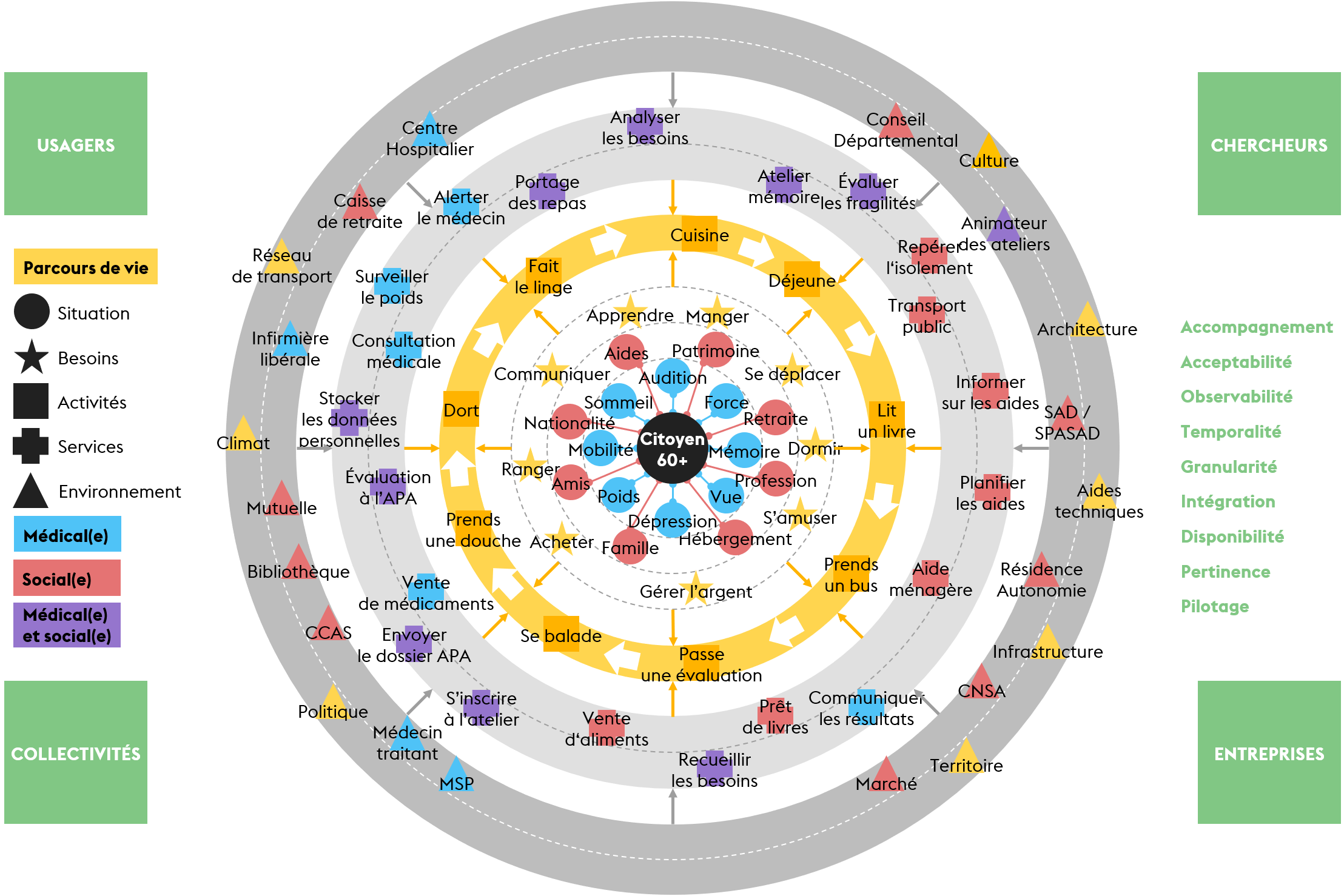Healthy ageing is “the process of developing and maintaining the functional ability that enables well-being in older age” (WHO, 2015). Frailty is a clinical and a social syndrome relative to ageing. In medical context, frailty characterizes an intermediate state between robust health and the loss of autonomy. It points the beginning of the decline in one’s capacities, a progressive evolution towards the dependency on other people regarding everyday life activities (i.e. eating, dressing, transferring, but also money management, shopping, or cooking). In the social context, it depicts a precarious situation regarding, for example, interactions with others (family, friends, community), safety, material resources, or physical environment of life.
The preservation of one’s capacities fits into a preventive approach and a management process based on one hand on a detailed knowledge about his/her medical and social situation, and his/her environment of life, and on the other hand – on the detailed knowledge of preventive solutions (i.e. services, products or activities) accessible within a given territory.

The person-oriented knowledge is first gained through the screening of the global population, aiming to identify potentially pre-frail or frail individuals. Next, a more complete understanding is gained through an extensive evaluation of capacities and needs, based on standardized tests and questionnaires. These knowledge enables medical and social professionals to provide preventive recommendations and to negotiate with the person his/her preventive action plan aiming to restore or to maintain his/her functional abilities. Finally, this knowledge needs to be regularly updated and extended, both the knowledge of the medical and social situation, and the effective adoption of personalized preventive interventions.
On the other hand, the solution-oriented knowledge is distributed among different preventive approach actors, that prescribe, recommend, finance, authorize, provide etc. different preventive solutions. This knowledge is made available to the citizens and to professionals through multiple channels, including institutional websites, communities, networks, organizational repositories, or even word of mouth.
Methods from Computer Science and from Engineering Science offer sociotechnical means to facilitate data collection, treatment, and communication, in order to create extensive person-oriented and solution-oriented knowledge repositories, both for the ageing citizens and their relatives, and for the network of professional and institutional actors within the preventive approach.
Objectives
BL.SenseLife is a Research and Development program aiming to support the continuous design and implementation of personalized preventive approaches by (1) enabling seamless data collection, analysis and communication within the environment of life, and by (2) supporting the decision making about the preventive pathway among the elderly and among professionals by matching one’s needs with preventive solutions. In order to reach these objectives, BL.SenseLife calls for the consideration of preventive pathways as an integrative part of individual life pathways, and suggests to see the latter as a process of ongoing negotiation between one’s needs (demand) and between solutions available to him/her (offer). This proposition is inspired from Service Blueprinting, a process modelling approach used within Service Science. BL.SenseLife strives to make a new proposal for the representation and the analysis of Needs (N), Activities(A) and Physical Services (PS) and Digital Services (DS) on a daily basis and over time, in reference to health, autonomy, well-being and quality of life.
Among the objectives of BL.SenseLife are :
- Co-design of a solution-oriented representation of life pathway of ageing citizens (individuals of 55 years and more);
- Co-definition of indicators representative of one’s medical situation, social situation and environment of life, that would be relevant both for professionals and for individuals, and easily observable on a daily basis;
- Co-design of a ICT platform that would support the expression of needs and preferences by the individuals, the knowledge of solutions available within the environment of life of the person, and the expression of personalized preventive recommendations by professionals.
BL.Frailty
In a first attempt, we have worked on a prototype of an ICT platform with the objective to support professionals and individuals in the assessment of frailty at home. The prototype, named BL.Frailty, consists of a knowledge-based system relative to assessment surveys that is linked with a mobile application and an IoT device. At this stage, the prototype implements two screening and nine evaluation surveys. Screening surveys are (1) GFST and (2) FIND. Evaluation surveys cover: (1) ADL, (2) IADL, (3) SPPB, (4) Tinetti, (5) MNA, (6) MMSE, (7) GDS, (8) Doloplus and (9) Algoplus. The knowledge database contains the results of analysis of semantic links between the assessment surveys, where some questions from different surveys are used to assess one same variable. The smartphone application is the principal part of the platform. It has three main components: (1) connection page, (2) patient list, and (3) patient assessment record. Patient assessment record includes: (3.1) patient administrative data, (3.2) assessment surveys, (3.3) assessment measures, and (3.4) assessment charts. The IoT device is the scale “Body” by Nokia Withings. BL.Frailty was developed in 2017 in partnership with ISIS Engineering School (Castres, France) and it’s living lab Connected Health Lab (CHL), and with Centre Hospitalier Intercommunal Castres-Mazamet (CHIC; Castres, France). BL.Frailty was presented in 2018 on the French-Speaking Congress on Frailty. The feedback of community of professionals on BL.Frailty project has motivated further work on the subject, the R&D program BL.SenseLife.






Life Path Co-design and Management
In the next step, a solution-oriented representation of life-pathway was developed within a post-doctoral research project at INU Champollion, ISIS Engineering School, Connected Health Lab (2018-2019), and was presented at the 2019 edition of French-Speaking Congress on Frailty. It is now further developed and experimented within the ENVVIE project (ENvironnement Virtuel de VIE), led by Institut National Universitaire Champollion (INUC; Albi, France) and co-financed by the Tarn Conference of Funders of Autonomy Loss Prevention (Conférence des Financeurs de Prévention de la Perte d’Autonomie du Tarn; Albi, France). The ENVVIE project is realized in partnership with AGIR Association (retirement home and autonomous residency, Castres, France), with CHIC, and with I2ML Foundation (Living Lab specialized in longevity, Nîmes, France). The ENVVIE projects consists on the realization and the evaluation of preventive workshops for people of 60 years and more, and on a co-design approach of an autonomous residency in Castres.

Knowledge Graph
Since September 2019, and in partnership with CHL-ISIS-INUC, we work on the design of a knowledge database that would enable to characterize an elderly citizen and the offer of preventive solutions in his/her environment of life, and that would be able to provide personalized suggestions of solutions according to one’s capacities, needs, preferences and constraints. This work consists on the design of an original knowledge graph and a set of exploration queries, according to a pre-defined list of preventive use cases. It is based on the use of Neo4j graph platform. The first prototype of an ICT platform based on this knowledge database will be presented in the autumn of 2020.The co-design of the ICT platform will be carried between September 2019 and June 2020, in partnership with CHL-ISIS- INUC.





